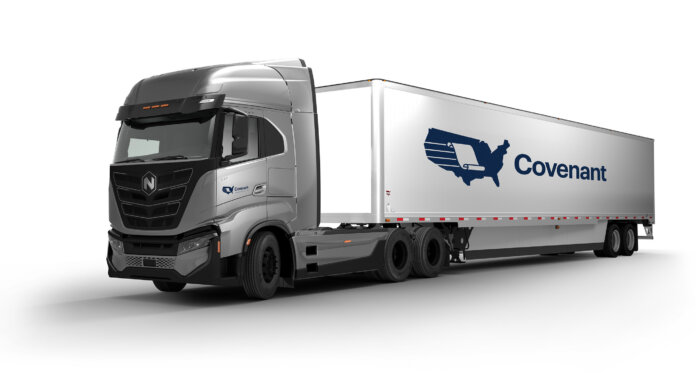Covenant Logistics Group Inc. is adding 50 zero-emission vehicles from Nikola Corp. to its fleet. This collaboration includes a letter of intent (LOI) for 10 Nikola Tre battery-electric vehicles (BEV) and 40 Nikola Tre fuel cell electric vehicles (FCEV), following the satisfactory completion of a Nikola Tre BEV and Nikola Tre FCEV demonstration program.
Delivery to Covenant of the first Tre BEV truck and mobile charging trailer for testing is anticipated to occur in Q2 2022, with the Tre FCEV testing expected to follow in 2023.
“The Tre BEV and FCEV trucks are both uniquely equipped to offer zero-emissions service to Covenant’s wide range of customer applications,” says Pablo Koziner, president of Nikola’s Energy and Commercial division. “While the Tre BEV is ideally suited for short-haul, metro-regional applications, the Nikola Tre FCEV has an anticipated range of up to 500 miles and is expected to be a valuable addition to their highway regional operation. We are excited to partner with a strong national operation like Covenant supported by our dealer network.”
“Nikola’s battery-electric and hydrogen roadmap fits perfectly with Covenant’s approach to sustainability as we increasingly work with customers to minimize their scope three emissions and meet their ESG initiatives,” mentions Matt McLelland, Covenant’s VP of sustainability and innovation. “Adoption of BEV and FCEV technologies are an important part of Covenant’s long term commitment to the decarbonization of freight and we are excited about this opportunity to partner with Nikola to meet these goals.”





Good luck being “environmentally friendly” with the environmental cost of producing and disposing of the batteries required in these vehicles. “Zero Emissions” from the tail pipe means little when you have significant environmental damage from the mining of the minerals needed for the batteries in addition to the fact that most of the electricity you use will come from fossil fuel generated power plants. Take a look at RNG fueled trucks and buses. Much more “carbon negatvie” than either Total Electric Vehicles or Fuel Cell Vehicles when you consider “well to wheel” carbon costs. Also MUCH cheaper to buy the… Read more »